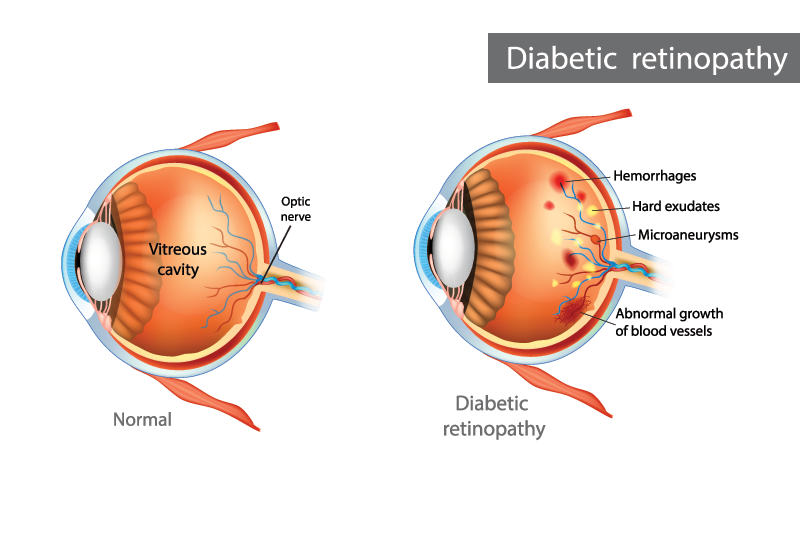What is Diabetic Retinopathy?
Diabetic retinopathy is an eye condition that is caused by diabetes. Like other parts of your body, diabetes can cause damage to your eyes.
To avoid vision damage from untreated diabetic retinopathy, it’s best to see your eye doctor for regular exams. This eye condition often occurs when blood sugars are not controlled for a period of time.
When your blood sugars are high, it can cause damage to the blood vessels at the back of your eye. When these blood vessels are damaged, they can begin to swell and leak, significantly impacting your vision. Consistently high blood sugar can also cause abnormal blood vessels to grow. When either of these situations occurs, it can affect your vision.

How Do Eye Doctors Test for Diabetic Retinopathy?
If you have diabetes, your primary care provider will likely recommend that you are seen by your eye doctor at least once a year. The purpose of these exams is to ensure that there have not been any changes in your vision or your eyes due to diabetes.
At your yearly diabetic eye exam, your eye doctor will ask a variety of questions about your general health and your vision. In addition, your eye doctor will likely ask you about your A1c and current blood sugar levels.
These levels will give your eye doctor information about how well controlled your diabetes is. Your eye doctor will also want to dilate your eyes at this visit.
There are many different conditions that can occur in the back of the eye. Without dilation, there is no way to view these structures and determine if they are healthy or not.
Your eye doctor will also check your vision to ensure no changes have occurred since the last visit. Once dilated, your doctor will use a special lens and a microscope to view your retina.
If your eye doctor detects diabetic retinopathy, they will be able to develop a treatment plan.
What Are the Symptoms of Diabetic Retinopathy?
In the early stages of the condition, diabetic retinopathy often shows little to no symptoms. Since you can have diabetic retinopathy and not know it, it is especially important to see your eye doctor regularly if you have diabetes.

In more advanced stages of the condition, you may notice symptoms such as:
- Blurry vision
- Difficulty seeing in dim lighting or worsening night vision
- Change in color vision
- Missing or blank spots in your vision
- Fluctuating vision
- Floaters
If you notice any of these symptoms, it is essential to seek treatment right away as they can indicate changes to your eyes due to diabetes.
How Do Eye Doctors Treat Diabetic Retinopathy?
Depending on its severity, your eye doctor will develop a treatment plan for your diabetic retinopathy. There are various treatment methods available, and your eye doctor will determine the method that will best fit your needs.
In addition to establishing a treatment plan, your eye doctor will also want to work on regulating your blood sugar. Your blood sugar levels will need to be within the normal range for your vision to stabilize.
At Jackson Eye Care, our eye doctor is dedicated to providing you with the best treatment methods available. To treat diabetic retinopathy, your eye doctor may recommend starting Anti-VEGF injections.
These treatments will help reduce swelling in the retina and thus improve your vision. In more advanced cases, certain eye surgeries like vitrectomy, laser coagulation, and other types of laser surgery may be necessary.
Do you have diabetes, and it’s been a while since your last eye exam? Schedule an appointment at Jackson Eye Care in Livingston, NJ, today!
